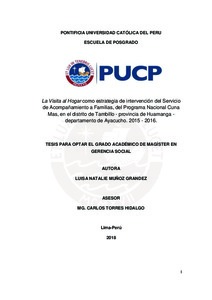| dc.contributor.advisor | Torres Hidalgo, Carlos | |
| dc.contributor.author | Nuñoz Grandez, Luisa Natalie | es_ES |
| dc.date.accessioned | 2019-05-02T20:06:59Z | es_ES |
| dc.date.available | 2019-05-02T20:06:59Z | |
| dc.date.available | 2019-05-02T20:06:59Z | es_ES |
| dc.date.created | 2018 | es_ES |
| dc.date.issued | 2019-05-02 | es_ES |
| dc.identifier.uri | http://hdl.handle.net/20.500.12404/14091 | |
| dc.description.abstract | La presente es una investigación cualitativa, sobre el Servicio de
Acompañamiento a Familias, (SAF); que ofrece el Programa Nacional CUNA
MÁS, para niños y niñas hasta los 3 años. El SAF tiene dos estrategias de
trabajo las visitas al hogar; y las sesiones grupales con familias usuarias.
Esta investigación se centra en la estrategia de VISITA A LOS HOGARES que
nos permite acercar al espacio cotidiano de implementación de la política, sus
procedimientos, competencias, y su contribución al desarrollo infantil. Se ha
estudiado, la identificación, análisis y valoración de las percepciones de las
familias usuarias, y de las facilitadoras que implementan el SAF.
Los principales hallazgos señalan las deficiencias del servicio en su fase
operativa; insuficiente criterio para la conformación del CG, lo que genera
ausentismo, falta de monitoreo y vigilancia de las acciones; así como, un débil
mensaje de prácticas de cuidados e higiene, las que no llegan a instalarse como
hábitos.
Algunos elementos que dificultan los objetivos; es el deterioro de los
instrumentos de trabajo (juguetes, cuentos etc). Otra dificultad es que la familia
no pone en práctica las acciones promovidas. Las familias, no participan
activamente en la validación o mejoramiento de la estrategia, incluso,
manifiestan sentirse usadas por el Programa para el cumplimiento de sus metas.
Estas deficiencias, se atribuyen a la inadecuada Gerencia social del Proyecto
SAF.
La propuesta planteada, apunta a la implementación de un trabajo estratégico
entre la organización comunal de la Junta de Regantes (JUDRA) y el PNCM, a
fin de potencializar un modelo de co-gestión que involucre la eficiencia del SAF y
la participación responsable y permanente de la comunidad, para impulsar
mayor conciencia de las familias y autoridades; sobre la primera infancia. | es_ES |
| dc.description.abstract | This is a qualitative research, on the Family Accompaniment Service, (SAF);
offered by the National Program CUNA MÁS, for children up to 3 years old. The
SAF has two homework strategies; and group sessions with family users.
This research focuses on the VISIT TO HOMES strategy that allows us to
approach the daily space of policy implementation, its procedures, competences,
and its contribution to child development. The identification, analysis and
evaluation of the perceptions of the user families and of the facilitators that
implement the SAF has been studied.
The main findings point out the deficiencies of the service in its operational
phase; insufficient criteria for the conformation of the CG, which generates
absenteeism, lack of monitoring and surveillance of the actions; as well as a
weak message of care and hygiene practices, which are not installed as habits.
Some elements that hinder the objectives; It is the deterioration of the
instruments of work (toys, stories etc). Another difficulty is that the family does
not put into practice the promoted actions. The families do not participate actively
in the validation or improvement of the strategy, they even say they feel used by
the Program for the fulfillment of their goals. These deficiencies are attributed to
the inadequate social management of the SAF Project.
The proposal put forward, aimed at implementing a strategic work of the
permanent community organization of the Board of Irrigators (JUDRA) and the
NMCP, to potentiate a model of co-management involving efficiency SAF and
responsible participation and of the community, to promote greater awareness of
families and authorities; about early childhood. | es_ES |
| dc.description.uri | Tesis | es_ES |
| dc.language.iso | spa | es_ES |
| dc.publisher | Pontificia Universidad Católica del Perú | es_ES |
| dc.rights | info:eu-repo/semantics/openAccess | es_ES |
| dc.rights.uri | http://creativecommons.org/licenses/by-nc/2.5/pe/ | * |
| dc.subject | Desarrollo infantil | es_ES |
| dc.subject | Niños--Protección | es_ES |
| dc.subject | Programa Nacional Cuna Más (Perú) | es_ES |
| dc.title | La visita al hogar como estrategia de intervención del servicio de acompañamiento a familias, del Programa Nacional Cuna Mas, en el distrito de Tambillo - provincia de Huamanga - departamento de Ayacucho. 2015 - 2016 | es_ES |
| dc.type | info:eu-repo/semantics/masterThesis | es_ES |
| thesis.degree.name | Maestro en Gerencia Social | es_ES |
| thesis.degree.level | Maestría | es_ES |
| thesis.degree.grantor | Pontificia Universidad Católica del Perú. Escuela de Posgrado | es_ES |
| thesis.degree.discipline | Gerencia Social | es_ES |
| renati.discipline | 314127 | es_ES |
| renati.level | https://purl.org/pe-repo/renati/level#maestro | es_ES |
| renati.type | http://purl.org/pe-repo/renati/type#tesis | es_ES |
| dc.publisher.country | PE | es_ES |
| dc.subject.ocde | https://purl.org/pe-repo/ocde/ford#5.09.00 | es_ES |






